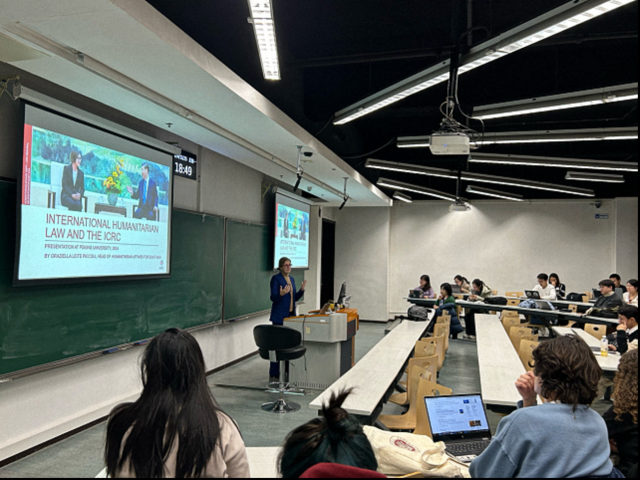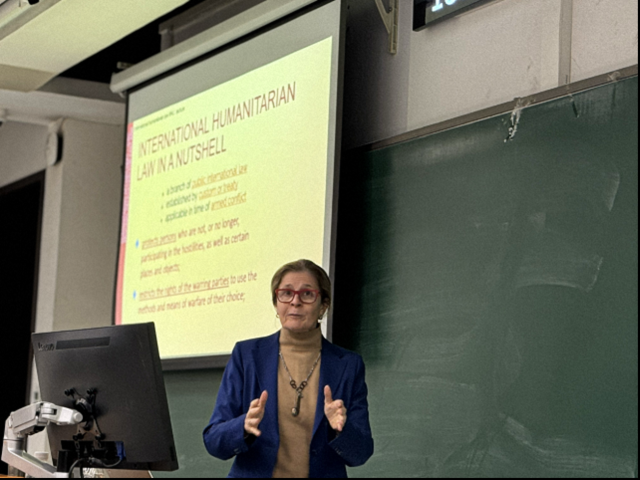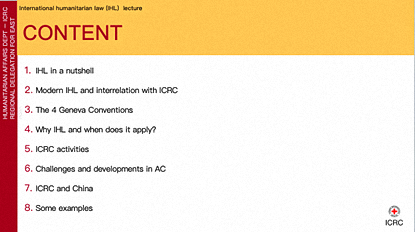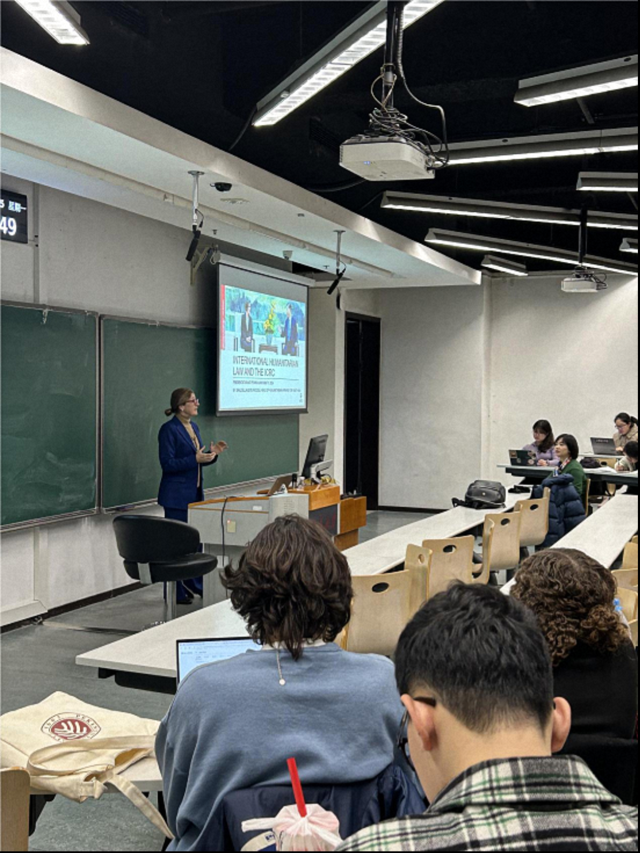On the evening of November 25, 2024, Ms. Graziella Leite Piccoli (Head of Humanitarian Affairs and Policy for East Asia, International Committee of the Red Cross (ICRC)) delivered a lecture titled “International Humanitarian Law and the International Committee of the Red Cross (ICRC)” to students from the School of International Studies (SIS), the School of Journalism and Communication, the School of Foreign Languages, the Law School, and Yenching Academy, among others.
With nearly 30 years of experience at the ICRC, Ms. Piccoli has organized and coordinated humanitarian relief efforts in conflict zones such as Iraq, Gaza, and Kabul. She currently serves as Head of Humanitarian Affairs and Policy for East Asia at the ICRC. The lecture was hosted by Asst. Prof. LAI Huaxia (Assistant Professor at SIS).


Ms. Piccoli’s Lecture
At the beginning of the lecture, Ms. Piccoli introduced the basic concepts of international humanitarian law (IHL). As a branch of public international law established through custom or treaties, IHL applies in times of armed conflict. It aims to protect persons and objects not participating or no longer participating in hostilities and to restrict the arbitrary choice of means and methods of warfare by belligerents. The origins of IHL date back to the Battle of Solferino in 1859, when Swiss businessman Henry Dunant, witnessing the horrors of war, mobilized local residents to assist the wounded. This experience led to the founding of the ICRC and the emergence of IHL.

Overview of the Lecture
Ms. Piccoli explained that the development of modern IHL has been accompanied by the conclusion and continuous improvement of a series of conventions and protocols. The first international treaty protecting the wounded and sick on the battlefield was adopted in 1864, followed by numerous revisions and supplements. Notably, the 1949 Geneva Conventions provide protection for civilians, medical personnel, humanitarian workers, the wounded and sick, shipwrecked soldiers, and prisoners of war. The 1977 and 2005 Additional Protocols further clarified the rules applicable to international and non-international armed conflicts.

Classroom Scene
Ms. Piccoli emphasized that by regulating the conduct of hostilities, IHL saves lives and alleviates suffering during armed conflict, embodying the spirit of humanity. Founded in 1863 and headquartered in Geneva, the ICRC is an independent and neutral organization with approximately 18,000 staff members operating in over 80 countries worldwide. Its core activities cover protection, assistance, prevention, and cooperation. With its neutrality, unique historical mission, ability to engage in dialogue with all parties to conflicts, and extensive cooperation network, the ICRC plays a vital role in the humanitarian field.
Ms. Piccoli shared her personal experiences in Gaza and recounted the ICRC’s active response to humanitarian crises such as the Syria earthquake and the Russia-Ukraine conflict, including efforts to protect civilians and civilian infrastructure, provide medical assistance, facilitate the release of hostages, and repair water facilities. She also highlighted China’s growing role in humanitarian action, including promoting IHL, advancing humanitarian dialogue, cooperating with armed forces, and contributing to global health diplomacy.
Faced with the increasingly protracted, fragmented, and technological nature of modern conflicts, Ms. Piccoli pointed out that the development of digital technologies has blurred the boundaries between cyberspace and reality. Cyber operations in armed conflicts are becoming increasingly complex, posing various challenges to civilians and humanitarian organizations, such as threatening civilian infrastructure, escalating violence, and undermining trust in humanitarian organizations. These developments require humanitarian actors to rethink and adapt their approaches to meet the challenges of the digital transformation.

Ms. Piccoli Engages in Dialogue with Students
During the interactive session, students actively posed questions. One student inquired about the practical application of IHL in modern complex conflicts, specifically how to ensure the effective implementation of IHL rules and the protection of civilians and humanitarian services amid the rapidly changing dynamics and multiple actors involved. Another student asked about the ICRC’s cooperation with major technology companies, seeking insights into their plans for addressing the humanitarian challenges posed by cyber conflicts. Drawing on her extensive experience and expertise, Ms. Piccoli provided detailed and insightful responses, deepening students’ understanding of IHL and the work of the ICRC.
The lecture, rich in cases and accessible in style, not only offered students a deeper understanding of IHL and the ICRC but also inspired critical thinking on international humanitarian issues. As a seasoned humanitarian practitioner, Ms. Piccoli provided PKU students with profound insights into the application of IHL and the ICRC's work. Her lecture also served as an important reference and inspiration for students interested in further exploring and researching international humanitarian organizations. The lecture concluded with enthusiastic applause.
In January 2024, the School of International Studies (SIS), PKU signed a Memorandum of Understanding with the ICRC’s East Asia Regional Delegation. This lecture was part of a series of cooperative courses and represents a concrete achievement of institutionalized course development under the Memorandum of Understanding framework.
Written by: Fang Ronghan
Photo by: Fang Ronghan, LAI Huaxia
Edited by:Lai Huaxia